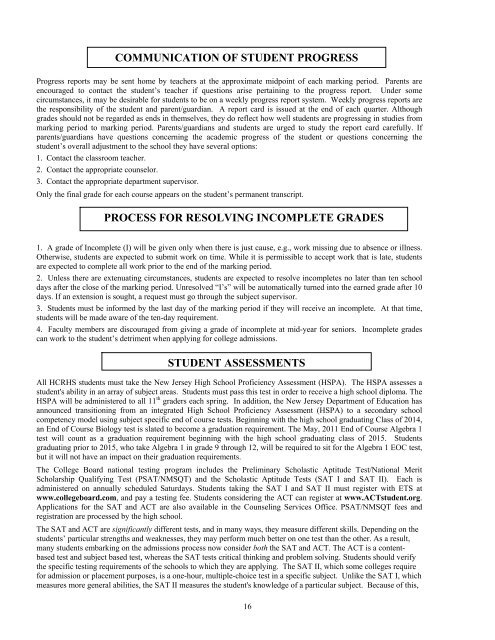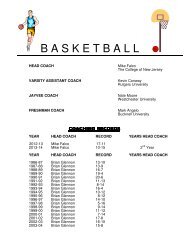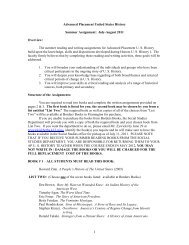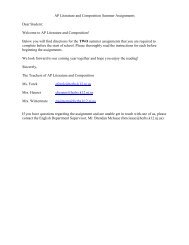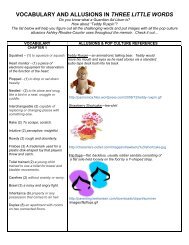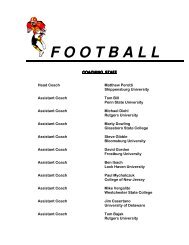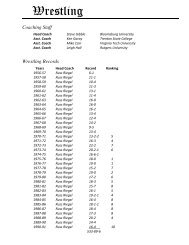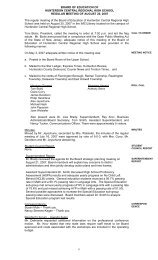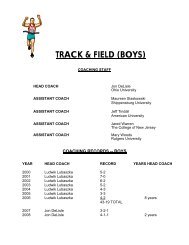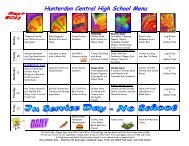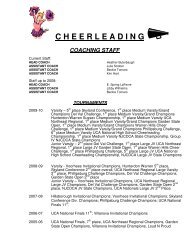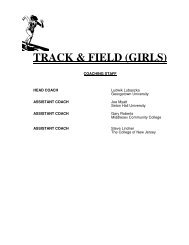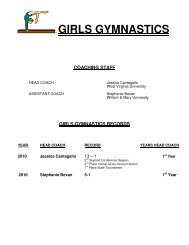Program of Studies - Hunterdon Central Regional High School
Program of Studies - Hunterdon Central Regional High School
Program of Studies - Hunterdon Central Regional High School
Create successful ePaper yourself
Turn your PDF publications into a flip-book with our unique Google optimized e-Paper software.
COMMUNICATION OF STUDENT PROGRESS<br />
Progress reports may be sent home by teachers at the approximate midpoint <strong>of</strong> each marking period. Parents are<br />
encouraged to contact the student’s teacher if questions arise pertaining to the progress report. Under some<br />
circumstances, it may be desirable for students to be on a weekly progress report system. Weekly progress reports are<br />
the responsibility <strong>of</strong> the student and parent/guardian. A report card is issued at the end <strong>of</strong> each quarter. Although<br />
grades should not be regarded as ends in themselves, they do reflect how well students are progressing in studies from<br />
marking period to marking period. Parents/guardians and students are urged to study the report card carefully. If<br />
parents/guardians have questions concerning the academic progress <strong>of</strong> the student or questions concerning the<br />
student’s overall adjustment to the school they have several options:<br />
1. Contact the classroom teacher.<br />
2. Contact the appropriate counselor.<br />
3. Contact the appropriate department supervisor.<br />
Only the final grade for each course appears on the student’s permanent transcript.<br />
PROCESS FOR RESOLVING INCOMPLETE GRADES<br />
1. A grade <strong>of</strong> Incomplete (I) will be given only when there is just cause, e.g., work missing due to absence or illness.<br />
Otherwise, students are expected to submit work on time. While it is permissible to accept work that is late, students<br />
are expected to complete all work prior to the end <strong>of</strong> the marking period.<br />
2. Unless there are extenuating circumstances, students are expected to resolve incompletes no later than ten school<br />
days after the close <strong>of</strong> the marking period. Unresolved “I’s” will be automatically turned into the earned grade after 10<br />
days. If an extension is sought, a request must go through the subject supervisor.<br />
3. Students must be informed by the last day <strong>of</strong> the marking period if they will receive an incomplete. At that time,<br />
students will be made aware <strong>of</strong> the ten-day requirement.<br />
4. Faculty members are discouraged from giving a grade <strong>of</strong> incomplete at mid-year for seniors. Incomplete grades<br />
can work to the student’s detriment when applying for college admissions.<br />
STUDENT ASSESSMENTS<br />
All HCRHS students must take the New Jersey <strong>High</strong> <strong>School</strong> Pr<strong>of</strong>iciency Assessment (HSPA). The HSPA assesses a<br />
student's ability in an array <strong>of</strong> subject areas. Students must pass this test in order to receive a high school diploma. The<br />
HSPA will be administered to all 11 th graders each spring. In addition, the New Jersey Department <strong>of</strong> Education has<br />
announced transitioning from an integrated <strong>High</strong> <strong>School</strong> Pr<strong>of</strong>iciency Assessment (HSPA) to a secondary school<br />
competency model using subject specific end <strong>of</strong> course tests. Beginning with the high school graduating Class <strong>of</strong> 2014,<br />
an End <strong>of</strong> Course Biology test is slated to become a graduation requirement. The May, 2011 End <strong>of</strong> Course Algebra 1<br />
test will count as a graduation requirement beginning with the high school graduating class <strong>of</strong> 2015. Students<br />
graduating prior to 2015, who take Algebra 1 in grade 9 through 12, will be required to sit for the Algebra 1 EOC test,<br />
but it will not have an impact on their graduation requirements.<br />
The College Board national testing program includes the Preliminary Scholastic Aptitude Test/National Merit<br />
Scholarship Qualifying Test (PSAT/NMSQT) and the Scholastic Aptitude Tests (SAT I and SAT II). Each is<br />
administered on annually scheduled Saturdays. Students taking the SAT I and SAT II must register with ETS at<br />
www.collegeboard.com, and pay a testing fee. Students considering the ACT can register at www.ACTstudent.org.<br />
Applications for the SAT and ACT are also available in the Counseling Services Office. PSAT/NMSQT fees and<br />
registration are processed by the high school.<br />
The SAT and ACT are significantly different tests, and in many ways, they measure different skills. Depending on the<br />
students’ particular strengths and weaknesses, they may perform much better on one test than the other. As a result,<br />
many students embarking on the admissions process now consider both the SAT and ACT. The ACT is a contentbased<br />
test and subject based test, whereas the SAT tests critical thinking and problem solving. Students should verify<br />
the specific testing requirements <strong>of</strong> the schools to which they are applying. The SAT II, which some colleges require<br />
for admission or placement purposes, is a one-hour, multiple-choice test in a specific subject. Unlike the SAT I, which<br />
measures more general abilities, the SAT II measures the student's knowledge <strong>of</strong> a particular subject. Because <strong>of</strong> this,<br />
16


